
2020-09-11
住民紹介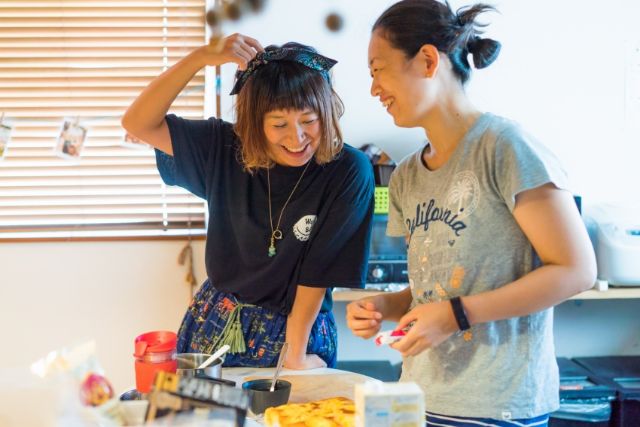

[:ja]
共同生活を送るということは、通常の友人よりも近い距離感で生活を共にすることになります。だからこそ得られる「本物の家族ではないけど、友達でもない、第二の家族のような関係性」という新しい関係性が生まれるコミュニティがシェアハウスという場所。普段だったら知るはずもなかった他人の価値観を、共同生活の場を通して知り、その違いから新しい発見や視野の広がりにつながることが何よりシェアハウスの醍醐味です。
絆家シェアハウスに出会って「人生豊かになった!」と伝えてくれるファミリーは、まさにこの「人と人との異なる価値観や多様性」によって自分の視野や世界が広がった!と話してくれることが多いです。
もちろん違う価値観を持つ人間同士だからこそ、衝突やトラブルが全くないわけではありません。絆家シェアハウスでは「衝突が起きない環境」を作ること以上に、「衝突が起きた際にどういう風に乗り越えていくか」を大切に考えています。
絆家シェアハウスが大切にしたい、共同生活を送る上で確実に居心地が良くなる!コミュニケーションに関しての考え方を3つ、紹介させてください。
シェアハウスで暮らす上でこの3つがあれば、コミュニケーショントラブルのほとんどがなくなると信じてます。[:en]
When you live in a sharehouse, you’re living together at a closer distance than your normal friends. That’s why sharehouses are a place where a new kind of relationship is born – a relationship that is not that of a real family, but that of a “second family”, not friends either. One of the best things about a sharehouse is that you can learn about other people’s values that you would normally never know about, and through shared living you can discover new things and broaden your horizons.
We heard some voice from family members such as “The experience of living in Kizunaya sharehouse has enriched my life!” And the families who tell us that this very “different values and diversity of people” has expanded their horizons and their world! They often talk about it.
Of course, because people have different values each other, there are sometimes some conflicts or problems. At Kizunaya sharehouse, we don’t just try to create an environment where conflicts don’t occur, but we think that it’s important to think about how to overcome any conflicts that may occur.
Let us share three ideas about communication.
We believe that if you have these three ideas for living in a sharehouse, most communication problems will disappear.
[:]
Contents
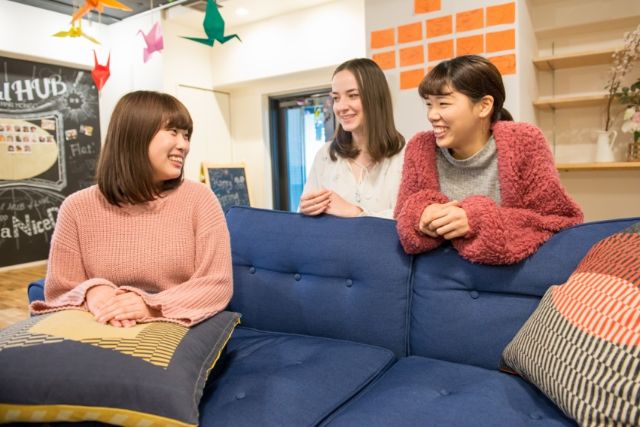
[:ja]
相談をいただく内容で、入居者同士のコミュニケーションに関する内容をいただきます。「最近入居したファミリーが、挨拶してくれなくて寂しい」「共同の部屋で暮らす上で、この人はルールを守ってくれない」など…。
もし自分にとって、他人のそのような行為で悩むことがあるのであれば、
「直接本人にコミュニケーションをとって聞いてみる」
シンプルにこれが一番早いコミュニケーショントラブルの解決策です。
例えばコミュニケーションに違和感を感じた際に、本人でなく他の誰かに相談をしたとしても、相談を受けた人は憶測で相談にのってあげることしか出来ません。
「もしかしてこの人は、こう思ってそういう態度をとったのかもよ」
「もしかしてそれは誤解かもしれないよ」「こういう風に考えたら、良いのでないかな?」
それによって少しは相手を理解する事に繋がるかもしれませんが、仮説である事にはかわりないため、問題自体が解決する事にはつながりません。
また、例えば誰か他の人に自分が傷ついた感情を伝え、それに共感してもらうこともよくあるケースですが、それでは居酒屋で上司のいないところで上司の愚痴を話して共感してもらう…という現象と同じで、直接的な解決にはやっぱりつながりません。
相手への関係性を諦める。これも一つの手ではありますが、もしそこに自分自身が違和感を覚えるのであれば、答えは一つしかないのです。
相手とのコミュニケーションで何か違和感や疑問を感じた時は、本人に直接聞いてみる。
それはとても勇気がいることかもしれませんが、「関係性を良くしたい」と思っているのであれば一番最短の問題解決方法です。
例えばふとした時に、「そういえば聞いてみたいことがあるんだけど…」と話しかけたり、「今度一緒に話したいんだ」と声をかけてみるのも手です。
話す際は、相手がどうしてその行為をとっているか、まず理解に徹して聴くこと。相手を知ると、誤解だったり、伝わっていなかっただけだったり、相手を知ることで今まで自分が見えていなかったものが見えてくるかもしれません。
また話し合いの際には、自分たちの意見を押し付け合うのでなく、相手がなぜその行為をしたのか?まず理解しようと聴くこと。その上で、自分の思ったことを押し付けるのでなく、単純に伝えてみること。「こうして欲しかった!」と相手に要求するのでなく、「自分はこういうことが悲しかった」と、伝えてみること。
その人をまず少しでも知ろうとするだけで、人間関係はあっというまに良い関係性を築くことが出来ます。
直接話し合うことが難しければ、絆家シェアハウスでは住民専用のコミュニケーション相談フォームを設け、どのようにしたらお互いが直接話し合うことができるか、どんな機会に声をかけられるかなどのアドバイスを含め、コミュニケーションのサポートをさせていただいています。
一番良くないことは「言いたいだけ」になってしまっていること。
コミュニケーションの疑問が生まれ、少しでも良くなりたいと思ったら、まず自分から直接本人と話し合ってみることを推奨しています。
勇気がいることだけど、相手をより知る機会にもなるので、お互いの関係性がよくなるだけでなく、自分にとってのシェア生活も居心地の良いものに変わります。
本当の意味で「いろんな価値観を知る」ということは、このようなコミュニケーションや対話があって、知ることができるのかもしれません。
前提として絆家シェアハウスでは、このようなコミュニケーションの衝突は悪いものだと考えていません。シェアハウスでは、このような衝突は運営者にとっては「面倒なもの」と認識されるため、リビングを排除したり、極力トラブルを起こさないように入居者と運営者とでコミュニケーションを取らないようにするシェアハウスもありますが、私たちはこういった共同生活でのコミュニケーショントラブルにこそ、関係性が深まる要素があると信じています。
ただ、一番健全でないことは本人のいないところで不満を言うことだけになってしまうことや、相手に「こうして欲しい!」と求めすぎてしまうことです。誰もが居心地よくシェア生活を送りたいと願っているからこそ、お互い直接的に話し合い、互いを理解し合う時間を大切に考えています。
直接話し合うことは勇気のいることですが、それをチャレンジしよう!と思うファミリーに、私たちは全力でそのサポートをさせていただきたいと思っています。
[:en]
We receive questions and consultations about communication between residents. For example, you might say, “I miss my recent family members who moved in and didn’t say hello to me,” or “This person doesn’t follow the rules of living in a shared room…
If you are bothered by such behavior in others,
“The best way to solve it is to talk and communicate with the person directly.”
This is simply the quickest way to solve a communication problem.
For example, when you feel uncomfortable in communication, even if you ask someone else for advice, the person you ask can only help you with speculation.
”Maybe this person acted like this or that,” “Maybe it’s a misunderstanding,” “Maybe it’s better if you think of it this way.”
It may help you understand the other person a little better, but it is still hypothetical and will not solve the problem itself.
Also, it’s often the case that you tell someone else about your hurt feelings and get them to sympathize with you, but that’s just like complaining about your boss in a pub where he’s not around and getting them to sympathize with you, which doesn’t lead to a direct solution.
Giving up on the relationship with the other person. This is one way to do it, but if you feel uncomfortable with it, there is only one answer.
If you feel uncomfortable or question something in your communication with your partner, ask him or her directly.
That may take a lot of courage, but if you want to improve the relationship, it’s the shortest way to solve the problem.
For example, if you want to have a chance to talk, you can talk to someone on a moment’s notice and say, “I’ve got something I’d like to ask you…” or “I’d like to talk to you about it sometime”.
When you talk to someone, please listen with an understanding of why they are doing and what they are doing first. When you get to know the other person, you may find out that it was a misunderstanding, or you just didn’t get it, and as you get to know the other person, you may see things you didn’t see before.
Also, during the discussion, instead of forcing our opinions on each other, we should ask ourselves why the other person did and what he or she did. Listen to try to understand first. Then, instead of imposing what you think, simply tell them. ‘This is what I wanted you to do!’ Instead of demanding that the other person say, “This is what made me sad,” try telling the other person that you are sad.
If you try to get to know the person first, you can build a good relationship with them very quickly.
If you can’t talk to the person in question, Kizunaya has a communication consultation form exclusively for residents, and we will support you with advice on how to talk to each other directly and what opportunities you have to talk to each other.
The worst thing that can happen is that you “just want to say it”.
If a communication question arises and you want to get it better, we encourage you to talk to the person directly from you first.
It takes a lot of courage, but it also gives you a chance to get to know the other person better, which not only improves your relationship with each other, but also turns shared living into a comfortable one for you.
In the true sense of the word, it’s probably through this kind of communication and dialogue that you can learn about various values.
The premise is that at Kizunaya sharehouse, we don’t think that this kind of communication conflict is a bad thing. In some sharehouses, such conflicts are perceived as troublesome by the management, so some sharehouses exclude the living room or try to avoid communication between the residents and the management as much as possible in order to avoid causing problems, but we do not believe that that is a communal living. We believe that communication problems are what deepens the relationship.
However, the most unhealthy thing to do is to only complain in his or her absence, or to say to the other person, “I want you to do this!” That’s asking too much. We want everyone to feel comfortable living in a shared living environment, which is why we believe in taking the time to talk to each other directly and understand each other.
It takes a lot of courage to talk to each other in person, but we’re up for the challenge! We would like to do our best to support families.
[:]
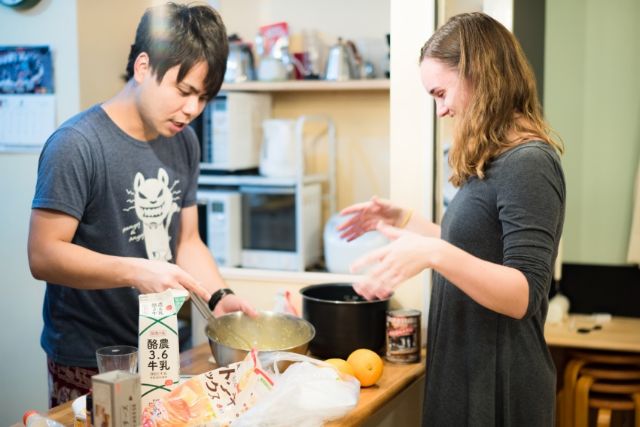
[:ja]
二つ目の大切にしたい考え方は、シェア生活に主体性をもつ、という考え方です。
コミュニケーションにおいてだけでなく、シェア生活全般において大切な考え方となりますが、相手に求める前にまず自分は何ができるのか?を考えることが他人との人間関係を育む上でとても大切な考え方だと信じています。
以前、こんなことをご意見頂いたことがあります。
「絆家シェアハウスはコミュニティシェアハウスでしょ!だから良いコミュニティを提供してくれるんでしょう?全然提供してもらえてない!もっとこうして欲しい!」
・・・御免なさい。私たちはファミリーのみなさまのこのような「こうして欲しい」「ああして欲しい」と願う声を叶えてあげることは出来ないかもしれません。シェア生活は、「自分自身がどんなシェア生活を送りたいか?そしてそのために自分がどんなことがここで出来るか?」ご自身のこの2つの意志があって初めて私たちはそのサポートをさせていただけると思っています。
もちろん管理運営面(修繕や運営業務に関する内容)についてはなるべくスピーディーに、適切に管理させていただきたいと思っております。その上でコミュニティ作りやシェア生活においての主役はファミリーの皆。「何かしてもらえる」ものはここにはなく、「こういう風に過ごしたい」と願う事に対して、私たちはそのサポートをさせていただきたいと思っています。
また、シェア生活では「こうしてくれない!」「こうしてほしい!」と願うよりも、「こういう風にしてみる!」「自分でやってみる!」という主体性があってこそ、楽しさが倍増します。シェア生活においてだけではないかもしれませんが、何かコミュニケーションのトラブルや問題があった際も、「自分は何ができるだろう?」をまず考えてみることで、生活が倍、居心地よくなります。
またこれを考えることも難しい!自分一人では考えられない!という場合は、シェアハウス歴の長い運営メンバーが、こんな風にしてみたらどう?というコミュニケーションのアドバイスやフォローをさせていただきます。
通常のシェアハウス会社は不動産会社であるケースが多く、運営者が生活の内情を知らないケースがほとんどです。また、入居後のコミュニケーションのサポートを行う運営業態はほとんどないに等しいと思います。
その点絆家シェアハウスはシェアハウスでの生活を長く経験しているメンバーが運営者でもあるので、いろんなケースにおいて、どう考えたらシェア生活がより楽しくなるか?の経験値をたくさん持っています。是非気軽に、あなたが何ができるか。一緒に考えさせてください。
[:en]
The second important concept we want to emphasize is the idea of having a sense of independence in sharehouse living.
We think it’s important to ask yourself what you can do first before asking others for help not only in communication, but also in general shared life, We believe that thinking about others is very important in fostering relationships with others.
Here’s what someone once said to us;
“Kizunaya sharehouse is a community share house! So they provide a good community, right? They’re not providing it at all! I want you to do this more!”
I’m sorry. We may not be able to fulfill your wishes for a shared life. We can’t give you the kind of life you’d like to live in a sharehouse, but we can support you with your two types of wills of your own: “What kind of life do I want to live here?” “Can I do here to make that happen?” We believe that we can only support you when you have these two wills of your own.
Of course, we’d like to manage operations of the sharehouse as quickly and appropriately as possible. On top of that, the main role in community building and sharehouse living is done by our family members. There’s nothing here that can be done for you, but rather we’d like to support you in your desire to live your life in this way.
Also, when you live in a sharehouse, you can’t be like “Do it this way!” “I want you to do this!“ Rather than wishing them, if “you think I’ll try it this way!” “I’ll try it myself!” and the fun is only multiplied when you have the initiative to do so. It’s not just in shared living, but when you have a problem with communication, you can ask yourself, “What can I do? You can double and cozy up your life.
Thinking about this again is hard? “I can’t think on my own!” If this is the case, a member of the management team who has been running the sharehouse for a long time will say “why don’t you try something like this?” We will give you advice and follow up on communication with them.
In most cases, sharehouse companies are real estate companies, and in most cases, the operators do not know the ins and outs of life. Also, there are almost no sharehouse management companies that provide support for communication after moving in.
On the other hand, Kizunaya sharehouses are run by members who have experience living in a sharehouse for a long time, so in various cases, they’ll help you think of ways to make your sharehouse life more enjoyable. Please feel free to ask us what you can do to help. Let us think about it with you.
[:]
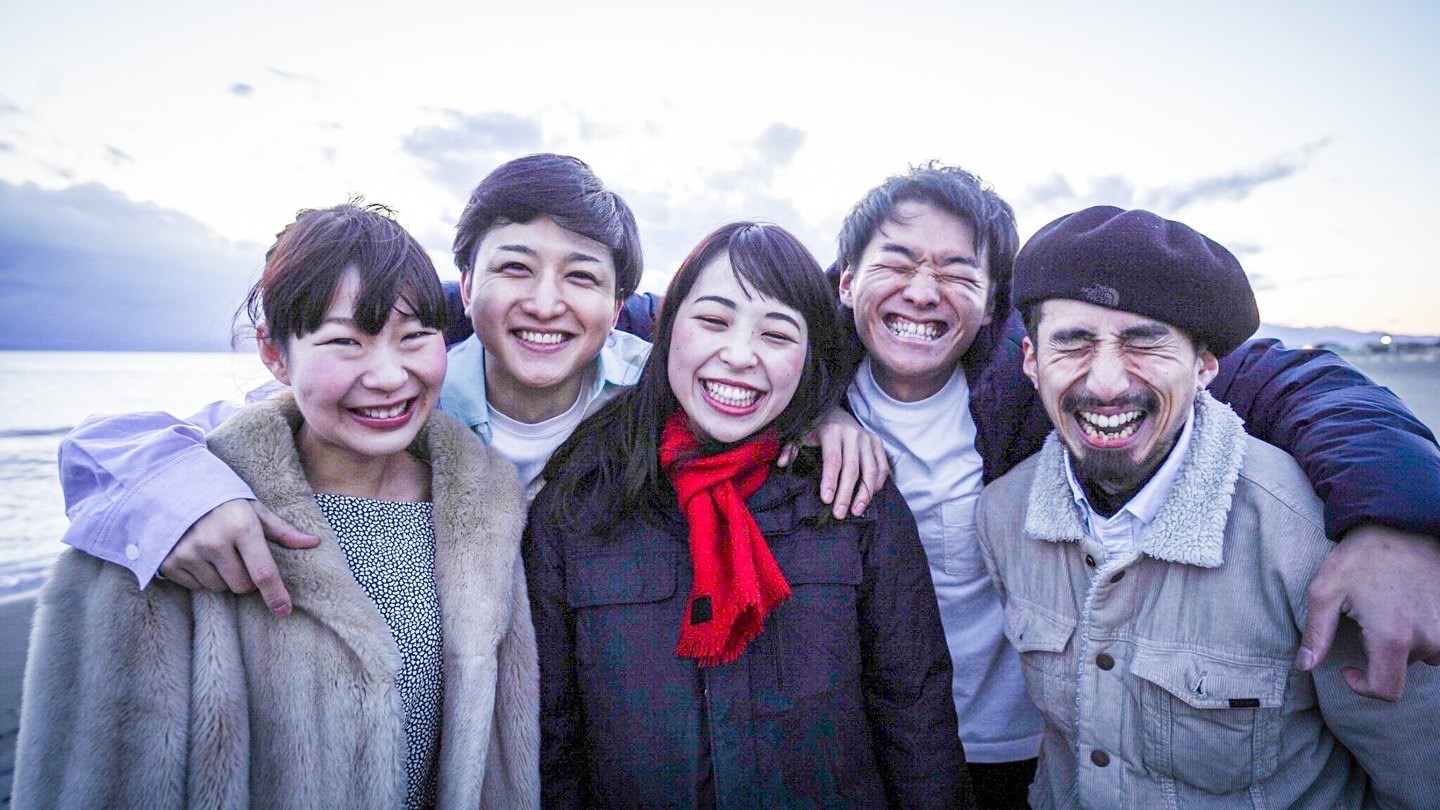
[:ja]
最後にお伝えしたいのは、当たり前のように思えて、実はすごく重要な事。
これはとても大切な事なのですが、何か思わしくないことが起きた時の主語は「自分」である上で、対話をしていく事です。(二回言いました)
よくあるケースとして「私は良いんだけど、他の人が困ってしまうから解決した方が良いと思う」「あの人が困ると思うから、代わりに代表として話を持ってきた」という問題のケースです。
絆家シェアハウスとしては、コミュニケーションの解決において「私」という主語がない相談に関しては、受け付けないようにしています。それは問題を不安に感じている、疑問に感じている当本人が不在の中で、仮説の中で話し合いを進めることは結果的に解決する対象者がいなくなってしまうからです。
「あの人がこう思っているから解決した方が良い」
「私は困ってないけど、周りは困っているから」は根本的な問題解決につながりません。
必ず問題に対して解決したいと思う本人同士が、直接的に対話することが一番スムーズな解決につながると思っています。そして大切なのは、あなたがどう感じているか、です。
困っている人のことを心配してあげることはとても思いやりのある、優しい考え方です。そんな人を見かけた時は、直接本人から問題解決の一歩を踏めるように伝えてあげてください。
絆家シェアハウスでは、本人からの声以外のトラブルに関してはサポートすることが出来ませんが、ご本人から相談があった際には上記の大切にしたい3つを踏まえ、ご本人が居心地の良いシェア生活を送ることができるようサポートさせていただきたいと思っています。[:en]
The last thing I want to tell you is something that seems obvious, but is actually very important.
This is very important, but when something doesn’t feel right, the subject of what happens is “you” and then you have a dialogue. (I’ve said it twice)
A common case of a problem is “I’m fine, but I think it’s better to solve it because it’s going to get other people in trouble,” or “I think that person is going to get in trouble, so I’m bringing it up as a representative instead.
As a Kizunaya sharehouse, we don’t accept consultations that don’t have “You (I)“ as a subject in resolving communication. The reason for this is that if the person who is worried or doubtful about the problem is not present, there will be no one to discuss the problem based on a hypothesis.
It is not possible to solve the fundamental problem by saying, “We should solve the problem because that person feels this way,” or “I’m not in trouble, but everyone around me is,” because this does not lead to a fundamental solution.
We think the smoothest way to solve the problem is to have a direct dialogue with the person who wants to solve the problem. And what is important is how you feel.
It’s a very compassionate and kind way of thinking to care for someone in need. When you see someone like that, please tell them directly from the person in question so that they can take a step toward solving their problem for themselves.
At Kizunaya, we can’t help you with any problems other than those voiced by YOU, but if you ask us for advice, we will help you to live a comfortable life in a sharehouse based on the above three important points.
[:]
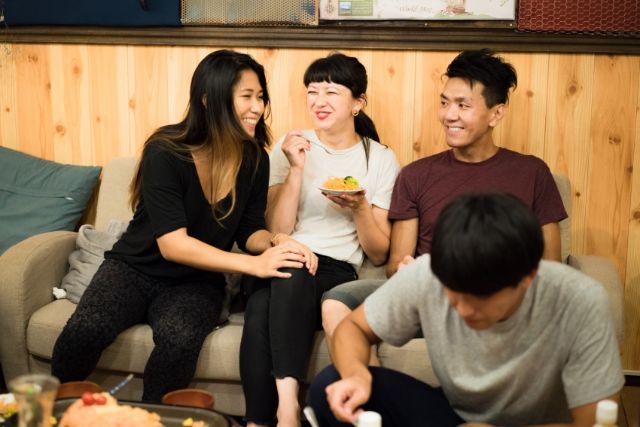
[:ja]
冒頭でもお伝えしましたが、絆家シェアハウスはトラブルや問題を悪いものだと考えていません。トラブルが起きた時に不満に変わってしまうこと、他責になってしまうことは健全的でないことだと考えています。
トラブルが起きた時、自分にとって思わしくないことが起きた時こそ、自分自身のシェア生活が深まる何かヒントがあるかもしれません。「シェア生活が学びになった」という「学び」とは、自分自身にとって思わしくない現状が目の前に現れた時こそ、新しい価値観が自分の中で生まれるきっかけになるかもしれません。
「面倒くさいなあ」と諦めることも本人の自由。それでも良いと思います。でも、もし自分の中で向き合いたい、考えたいと思う場合は、私たち運営メンバーは絆家で暮らすみなさんが居心地よくシェア生活を送るために、その気持ちを応援し、サポートしたいと考えています。
もしそれが解決されたときに、自分自身にとって世界が広がるきっかけになる情景を、たくさんみているから。入居者のみなさんのシェア生活が、居心地の良いものとなりますように!
※注
この記事にある「コミュニケーショントラブル」は契約範囲外の個人間の内容のものに関してになります。入居契約書に基づくトラブルに関しては運営者として適切な対応をさせて頂いております。[:en]
As we mentioned at the beginning of this article, Kizunaya sharehouse does not believe that problems and issues are bad. We think it’s not healthy to turn to dissatisfaction or blame others when problems arise.
When trouble arises, when things don’t go well for you, there may be some hints that will help you deepen your own shared life. When you learn from living in a sharehouse, it’s when you encounter something you don’t like that you can start to develop a new value system.
You are free to give up and say, “This is too much trouble. That’s fine. But if you want to face this in your mind, we would like to support you to live a comfortable life in Kizunaya.
If you want to make your life in Kizunaya comfortable, we want to support you. I wish all of our family members a very comfortable shared life!
Note:
The “communication problems” in this article are between individuals and are outside the scope of the contract. As the manager, we will deal with any problems based on the tenancy agreement.
[:]


kizunaya